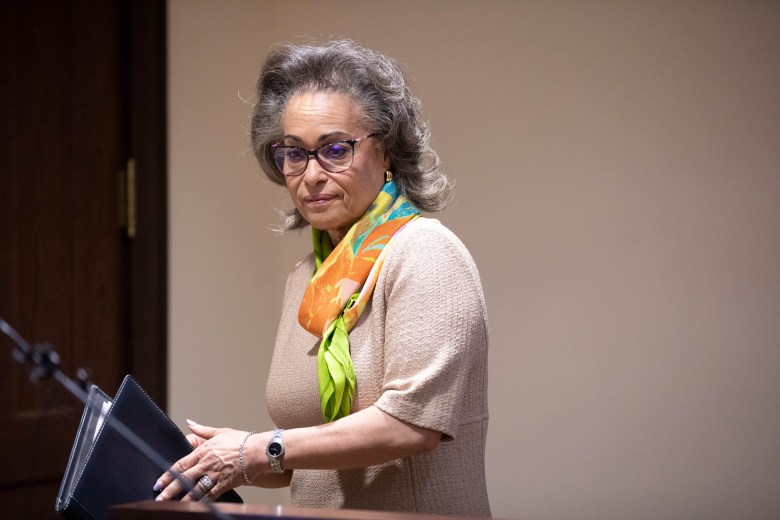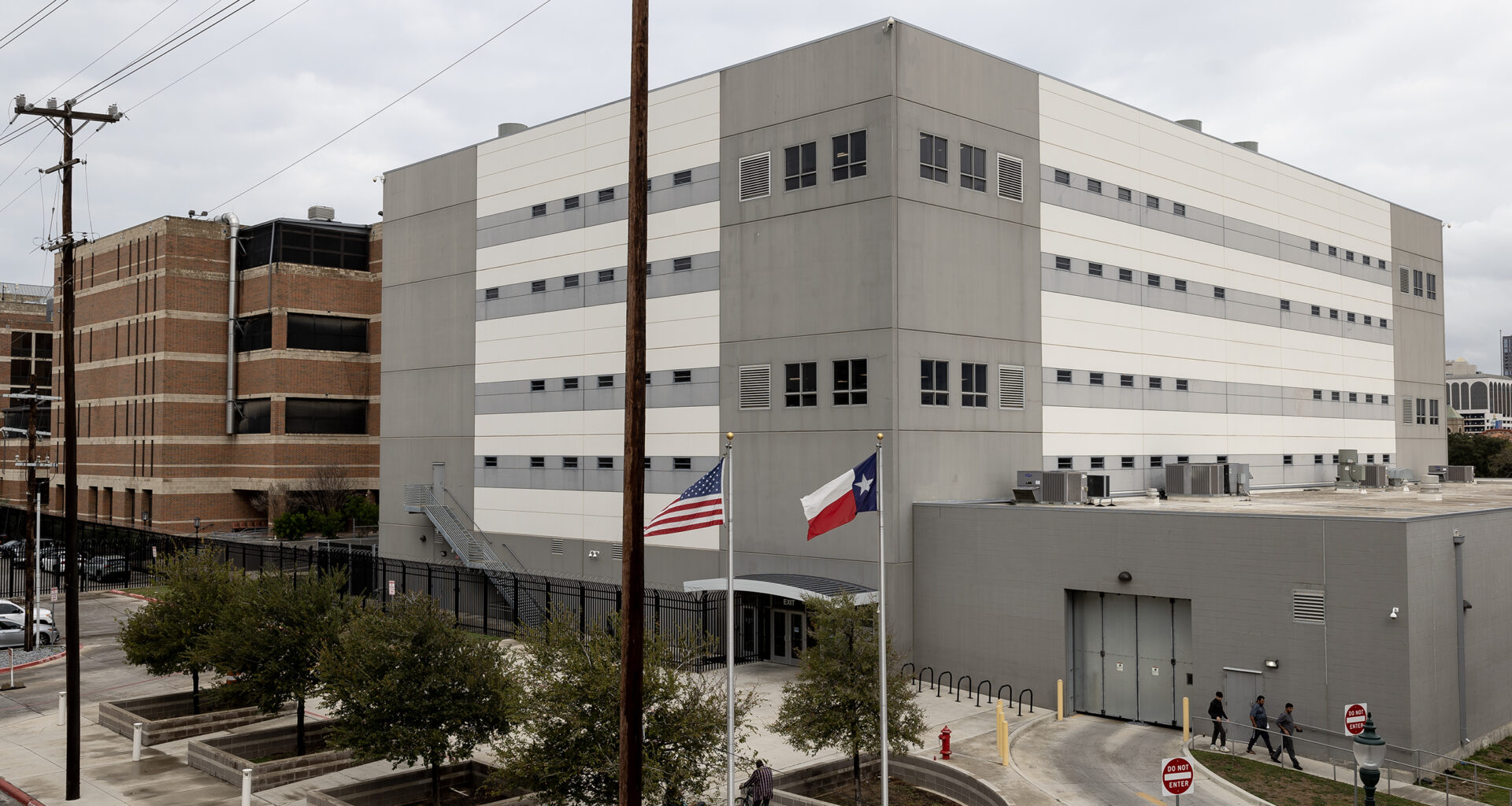Bexar County has shifted responsibility for jail intake mental health and substance use screenings from the Center for Health Care Services to University Health, ending a six-year contract and consolidating medical and behavioral health assessments under one provider for the first time since the Justice Intake and Assessment Annex opened in late 2018.
Before the change, CHCS conducted mental health screenings and University Health oversaw medical intake inside the facility. Once detainees were transferred into the jail, University Health assumed responsibility for both medical and behavioral health treatment.
In October 2023, Bexar County’s Office of Criminal Justice commissioned a study by the University of Texas Health Science Center at Houston to evaluate how efficiently the annex processed detainees and diverted individuals with behavioral health or substance use needs into treatment programs.
The study, led by Dr. Alexander Testa, presented its findings in February, it found fragmented communication, inconsistent data sharing and overlapping responsibilities among the multiple agencies operating inside the annex.
Based on the findings Testa and his team recommended consolidating screening and treatment under one provider or, alternatively, establishing a coordinated process that integrates behavioral health assessments into the medical intake already conducted by University Health.
After reviewing the recommendations, Bexar County’s Department of Public Health began exploring ways to address recommendations and strengthen the county’s diversion efforts.
“We were thinking, what does that mean for the providers that are there?” said Bexar County Public Health Director Dr. Andrea Guerrero. “University Health provides the physical services in the JIAA, but they also are the mental health providers once someone moves over to the jail. University Health is present and can perform both the medical and behavioral health pieces, but CHCS cannot perform both roles, and so the logical conclusion was that University Health would be better suited to provide both functions.”
Bexar County Public Health began making its recommendation to change providers to the county in August before it was approved for the 2026 fiscal year budget on Sept. 9.
University Health President and CEO Edward Banos described the change as part of a broader effort to improve continuity of care.
“I see this as an opportunity where we do see that there is a better continuity of care in the sense that we’re going to do these assessments on intake and then if they do need required psychiatric services, they’ll either get that provided by us in the jail or go to another appropriate facility,” Banos said. ”But when they do come back to the jail, it’s all going to be on one medical record.”
Banos said conversations with the county about the potential transition began months before the contract change, when officials reached out to determine whether University Health could take over intake services if the existing agreement with CHCS was not renewed.
The change, however, came as a surprise for CHCS after years of running the annex’s mental health screenings, said CHCS President and CEO Jelynne LeBlanc Jamison.
The local mental health authority contracted by the state did not know a change in provider was being considered.
“We were aware that Dr. Testa from the University of Texas School of Public Health at Houston conducted this evaluation of the operations at the JIAA, and for months we engaged Bexar County to try to understand what the findings were and how they were going to respond,” said Jamison. “Much to our surprise, we were notified the day before the county went to Commissioners Court to recommend that they contract with University Health for JIAA assessment services.”
Jamison said CHCS reviewed the report after finding a copy online and invited Testa to present his findings to the agency’s board after the change in contract had been announced.
 Jelynne LeBlanc Jamison, president and CEO of the Center for Healthcare Services in 2023. Credit: Scott Ball / San Antonio Report
Jelynne LeBlanc Jamison, president and CEO of the Center for Healthcare Services in 2023. Credit: Scott Ball / San Antonio Report
“He referenced that in the JIAA there’s no systemic process, there’s no obvious step one or step two, people are moved around based on availability and there’s no comprehensive system for people to be processed,” she said. “After he shared that, our board agreed with the recommendation that I made to them that, you know, Bexar County has a lot to fix and it’s probably okay that we’re not there.”
CHCS ended its role in the annex on Sept. 30, the final day of its contract; all but two staff members were reassigned to other programs. University Health began conducting screenings on Oct. 1. With no transitional period in place, Bexar Public Health assisted in staffing the annex as University Health trained 11 new positions.
“CHCS left. They weren’t helping out in the transition. They just left. But Dr. Guerrero and her staff at the county, really helped,” Banos said. “They were committed to making sure that we have all the staff up and running. I would say, kudos to the county for picking up a contract that seemed to have ended rather abruptly.”
Banos said University Health is expected to take over staffing fully by Nov. 10.
Guerrero said the decision to consolidate screenings was discussed with both agencies prior to the budget approval. “We informed CHCS prior to the first court date where we made the first presentation in August,“ she said.
She emphasized that CHCS remains a critical partner in the county’s behavioral health network.
“We still value CHCS as a partner — they are the local mental health authority, which by statute fills a very essential role in providing care to the community,” Guerrero-Guajardo said. “Mental health assessments at the JIAA are the only portion of that contract that has been transitioned over to University Health, specifically to streamline that process and increase diversions.”
CHCS continues to operate other mental health programs for the county, including the jail-based competency restoration initiative and assisted outpatient treatment for the courts. Jamison said CHCS will continue focusing on those efforts as well as expanding diversion options outside the jail.
“We continue to provide all of the outpatient services that we were providing before,” she said. “I’ve had some very successful and optimistic conversations with the community about the need for a diversion center and a lot of support for asking the board of managers at UH to consider making a psychiatric hospital a priority for Bexar County. So I’m hopeful that those conversations will continue.”
While Jamison acknowledged the county’s intent to streamline operations at the annex, she questioned whether a change in provider would address structural issues identified in the UTHealth study.
“I think they’re viewing the fact that we’re not there as streamlining the process, but I think we’ll just have to wait to see if that’s actually happening,” she said. “If they don’t address the technology and software upgrades, if they don’t address the staffing, if they don’t address the leadership in charge of that facility and the coordination required, then none of it will matter. It really won’t matter.”
